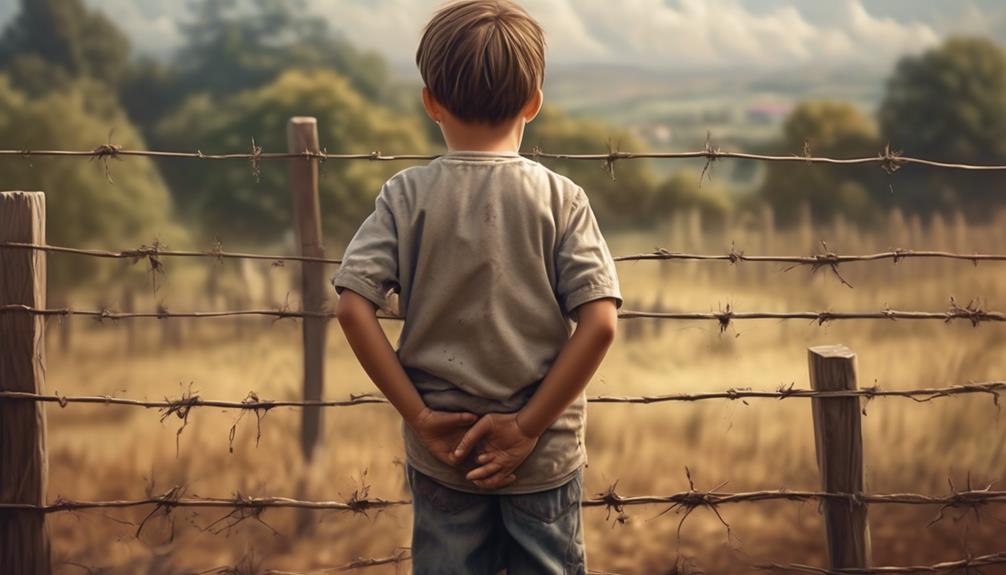Picture yourself navigating a turbulent ocean of feelings, unsure when the next wave will come crashing down. Growing up with a father who has Borderline Personality Disorder can make you feel like you are constantly preparing for the next blow, impacting your self-image and relationships with others.
The ripple effects of such an upbringing can shape our lives in profound ways, influencing our choices, behaviors, and overall well-being. Let's explore the intricate web of consequences that can stem from having a Borderline Father and how we can navigate these waters to find peace and healing.
Key Takeaways
- Borderline fathers contribute to emotional instability and fear in their children.
- Unpredictable behavior leads to family dynamics disruption and emotional turmoil.
- Criticism and control impact children's self-esteem and identity development.
- Seeking therapy is crucial for healing psychological distress caused by borderline fathers.
Impact on Child's Emotional Well-being
Indeterminate children raised by borderline fathers often grapple with emotional instability and insecurity stemming from the erratic behavior patterns exhibited by their parent. The child's emotional well-being is profoundly impacted by the fear of abandonment instilled by the unpredictable nature of the father's actions.
This constant state of uncertainty can lead to heightened anxiety and confusion, creating a turbulent environment for the child's emotional development. The lack of consistency and reliability in the father's behavior can hinder the child's ability to form secure attachments and regulate their emotions effectively.
Moreover, the manipulative tendencies of a borderline father can exacerbate the child's emotional vulnerability, making it challenging for them to trust and feel secure in their relationship with their parent. In essence, the emotional rollercoaster experienced by children of borderline fathers can significantly impede their emotional regulation and overall well-being, highlighting the critical need for stability and supportive caregiving in a child's formative years.
Relationship Dynamics and Instability

The impact of a borderline father's unpredictable behavior extends beyond the emotional well-being of their children, influencing the dynamics of relationships within the family unit. Living with a borderline father can introduce instability and emotional turmoil into the family dynamic. The constant fluctuations between intense interactions and sudden mood shifts can create confusion and distress among family members.
Boundaries become blurred, making it challenging to establish healthy relationship dynamics. Family members may find themselves on an emotional rollercoaster, experiencing extreme highs followed by devastating lows, which can take a toll on their emotional well-being. The unpredictability and volatility in the relationship with a borderline father can breed feelings of insecurity and distress, leaving family members in a state of unease.
These unhealthy dynamics can lead to a sense of instability within the family unit, affecting the overall well-being of those involved.
Self-Esteem and Identity Struggles
Children of borderline fathers often grapple with struggles related to self-esteem and identity formation as a result of the inconsistent love and emotional instability they experience. The impact of a borderline father's behaviors can have profound effects on a child's development, manifesting in various ways:
- Low Self-Esteem: Constant criticism and emotional manipulation can lead to children internalizing negative beliefs about themselves, resulting in low self-esteem.
- Identity Struggles: Controlling behaviors and lack of autonomy imposed by the borderline father can hinder the child's ability to form a stable sense of identity.
- Self-Doubt: Children may struggle with self-doubt as they try to navigate the conflicting messages and behaviors exhibited by their borderline father.
These challenges contribute to a complex web of emotional turmoil, where self-worth and confidence are frequently undermined. The lack of a nurturing and consistent emotional environment can exacerbate these issues, leading to ongoing struggles with identity formation and self-esteem.
Psychological Distress and Mental Health

Experiencing chronic psychological distress due to erratic behaviors and emotional instability is a common challenge for individuals raised by borderline fathers. Children of borderline fathers often face heightened anxiety and emotional turmoil as a result of their unpredictable environment.
The erratic behaviors and mood swings characteristic of Borderline Personality Disorder (BPD) can lead to long-lasting mental health issues such as depression, anxiety, and low self-esteem in these individuals. Constant criticism, emotional invalidation, and intense reactions from a borderline father contribute to the psychological distress experienced by their children.
The lack of emotional stability and consistent parenting further exacerbates the risk of mental health challenges for those raised by borderline fathers. It's crucial to recognize the profound impact that growing up in such environments can have on an individual's emotional well-being and overall mental health.
Seeking support and therapy can be vital in addressing and healing from the effects of being raised by a borderline father.
Long-term Effects and Healing Journeys
In navigating the long-term effects of growing up with a borderline father, individuals often encounter challenges related to emotional stability and forming healthy relationships. Children of borderline fathers may struggle with emotional instability, leading to difficulty regulating feelings well into adulthood. This can manifest in chronic guilt, shame, and trauma reactions triggered by minor incidents, impacting their ability to establish and maintain healthy connections with others.
Setting boundaries becomes crucial in safeguarding one's emotional well-being and fostering healthier relationships.
Prioritizing self-care is essential for individuals to heal from the wounds inflicted by a borderline father and nurture their mental and emotional health.
Seeking therapy offers a safe space to explore and address the deep-seated emotional scars left by growing up with a borderline father, facilitating the journey towards reclaiming autonomy and transforming past wounds into sources of strength and resilience.
Frequently Asked Questions
How Does a BPD Father Affect a Child?
A BPD father can deeply impact a child's emotional development. Their intense reactions and unpredictable behavior create instability, leading to emotional manipulation, harsh criticism, and low self-esteem in children.
Anger issues and outbursts can be traumatic, affecting the child's ability to form healthy relationships. The erratic parenting style causes confusion and insecurity.
Children may feel responsible for managing their father's emotions, resulting in emotional burden and psychological distress.
How Do You Know if Your Father Is Borderline Personality Disorder?
To recognize if a father has Borderline Personality Disorder, observe signs of intense emotions, unpredictable anger, impulsivity, unstable relationships, and extreme reactions to criticism. Look for identity struggles and unstable self-image patterns.
Seek professional evaluation if behaviors align with BPD traits. Being aware and understanding symptoms can lead to proper diagnosis and support.
What Is It Like to Have a Parent With Borderline Personality Disorder?
Living with a parent who's borderline personality disorder is challenging. We face constant emotional turmoil and uncertainty due to their unpredictable behaviors. Coping with extreme mood swings, intense anger outbursts, and manipulative tendencies becomes our norm.
Setting boundaries, seeking therapy, and reclaiming our autonomy are crucial steps for our emotional well-being. It's a complex journey that requires resilience and self-care to navigate the effects of a parent with borderline personality disorder.
Do Borderlines Love Their Children?
Yes, borderlines can love their children deeply. However, their emotional challenges may hinder their ability to consistently express this love in a healthy manner.
Their intense mood swings and instability can make it difficult for them to show consistent affection. Understanding this complexity is crucial in navigating relationships with borderline parents and promoting a supportive environment for both the parent and the child.
Conclusion
In conclusion, growing up with a Borderline Father can have lasting effects on a child's emotional well-being and relationships.
For example, Sarah struggled with forming healthy connections due to her father's erratic behavior, leading her to seek therapy and set boundaries to heal.
It's important to recognize the impact of a Borderline Father and prioritize self-care to overcome these challenges and thrive in the face of adversity.
Theresa is the visionary force behind Borderline Syndrom, steering our content towards excellence and integrity. With a keen eye for detail and a deep understanding of BPD, she ensures that our articles, stories, and resources offer our readers valuable insights, hope, and guidance. Theresa’s leadership not only shapes our editorial direction but also fosters a space where voices on BPD are heard and respected.










